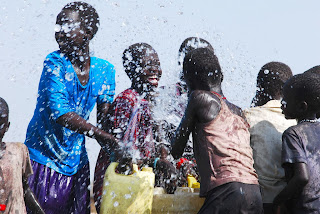In the spring of 2001, I received a phone call from an acquaintance asking if I could drive some refugees to a picnic. Sure, I told her. Then I hung up the phone and called down to Jeff in his home office. Honey? Where’s Sudan?
That weekend, Jeff, baby Clare, and I drove to a dilapidated home on the outskirts of Denver to pick up several young men—teens, really—all tall, dark and thin. With Clare sandwiched between them in the back seat, we drove into the mountains above Boulder to a wooded campground where 30 or so other refugees—all recent arrivals to the U.S.—and an equal number of Americans were gathered. Together, we grilled hamburgers and kicked soccer balls, and when the games and food were exhausted, we sat in small groups throughout the picnic area and heard the refugees’ stories.
Without apparent emotion, these gentle young men known as the Lost Boys of Sudan calmly told us how they had been at school or tending cattle when government-backed raiders attacked their villages, raping women and girls, capturing some as slaves, and killing men, women, and children who were unable to escape. We heard in horrifying detail how they ran from aerial bombings and the gunfire of soldiers, and spent the next several months walking hundreds of miles, their numbers growing as they joined up with other small groups of boys in the same predicament. They walked and walked, at times so hungry they ate mud and so thirsty they drank their own urine. And at night, when they slept on the ground in a tight cluster, the boys at the outermost edge of the group would creep over sleeping bodies to get closer to the center. This process would continue until dawn, each boy hoping to avoid the inevitable attack of a hungry lion during the night.
By the time they arrived at a refugee camp in Kenya, they had walked more than 1,000 miles and their numbers—estimated to be more than 30,000 at the outset—had been cut in half due to starvation, dehydration, drowning as they crossed the Nile, lion and hyena attacks, and the bullets of soldiers they encountered. After spending a decade in the harsh conditions of the camp, 4,000 or so Lost Boys immigrated to the U.S., about 60 of them to the Denver/Boulder area.
It is impossible to meet boys like these, hear their stories, and then simply say, “Well, good luck.” And so—along with dozens of other locals—we jumped in, helping our new friends find jobs, learn to cook, shop for necessities. During our first trip to the grocery store together, I had the deli worker sample various lunchmeats to the six guys who were with me. Then, while we waited for our order of sliced roast beef, Daniel asked me where in the store the live cattle were kept.
 Over time, Jeff’s and my relationship with the Lost Boys shifted from that of parents to that of friends, the focus of our interactions from job applications and cooking lessons to college graduations and citizenship ceremonies. In December 2006, Jeff went to Sudan with five other Americans and six Sudanese to help rebuild their homeland. He and Panther worked with a group of locals to drill several wells. Like blood, access to safe drinking water is a matter of life and death in sub-Saharan Africa, where 1 in 4 children dies of a water-borne disease before their fifth birthday.
Over time, Jeff’s and my relationship with the Lost Boys shifted from that of parents to that of friends, the focus of our interactions from job applications and cooking lessons to college graduations and citizenship ceremonies. In December 2006, Jeff went to Sudan with five other Americans and six Sudanese to help rebuild their homeland. He and Panther worked with a group of locals to drill several wells. Like blood, access to safe drinking water is a matter of life and death in sub-Saharan Africa, where 1 in 4 children dies of a water-borne disease before their fifth birthday. Today, Panther is completing his undergraduate degree while working fulltime. He is married to his refugee-camp sweetheart, Mary, and they’re raising their two young sons in Denver. Daniel managed to relocate five surviving family members to the U.S and is putting his brothers through college. He’s currently living in Sudan for a year to build schools and drill wells.
Download a PDF of the first 4 chapters of Lauren's memoir, Zuzu's Petals: A True Story of Second Chances, FREE here. Click on the link below the green "Buy the Book" button. Happy reading!

Lauren,
ReplyDeleteI wasn't sure how to comment. Sometimes words can not convey true sentiment. However, I wanted to try.
You are a spring of love and generosity. I am sure you know how inspirational you are, along with your whole family. Words can not convey the full scope that another human can feel towards another human in pain other than to be open and be involved. Thank you for being you!
Much love and joy to you!
Michele